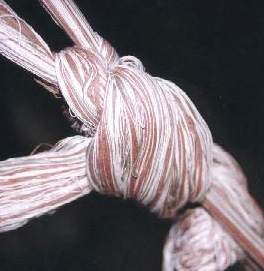The Handicraft Center for Northeastern Women's Development (NWD) was established in 1991 under the NGO Coordinating Committee on Rural Development. It was set up as an organization for the promotion of handicrafts and women's development issues. At first, the four founding members wanted to establish group activities permitting all members to share their ideas and work, participate in training sessions. Eventually the goal was to align with other NGOs and village groups working on similar issues or in the same region. After two or three years of organizing such activities, developing business and management skills became one of the group's main objectives. Indeed, the Handicraft Center's ultimate goal was to turn its work into a community business to be both run and owned by the village groups.

Prae Pan is one of these groups and perhaps the network's greatest success
story. Today, it is the strongest villager group in the NWD. The
cooperative members were trained by the NGO to make weaving, a traditional
village craft in this region of Thailand, an alternative for community
development and self-sustainability. The NWD taught them that a weaving
cooperative run by villagers would guarantee
them a better life and a more prosperous future for their children. Prae
Pan's objectives would be the following:
-
to preserve and teach others the techniques and traditional patterns of
Isaan hand
weavings
-
to provide a lasting career and steady income for women
-
to encourage women's participation in all aspects of community affairs
as they
cooperate with one another in the weaving project
The parent organization gradually withdrew as the village group has become stronger and now runs the community business on its own. The NWD now only works as an advisory body within the group and even buys some of Prae Pan's products for its local store (Mae Ying).
Prae Pan has been an official independent organization since 1992 when the members of the group participated in a meeting to determine how to set up their own community business and how to run it. They decided that each of the seven participating villages would elect two representatives to serve on the organization committee that meets on a monthly basis. Membership to the group was based on merit and the purchase of a company share worth 100 Baht ($2.50). All members were invited to participate in training sessions organized by the NWD on marketing, stocking, accounting and other such business skills, but also on women's role in politics, etc. Although the villagers were at first intimidated, they soon learned the necessary skills and acquired enough confidence to run their own business. In 1993, the cooperative managed to purchase a local situated in central Khon Kaen City. The building includes a showroom for its fabrics, a meeting room and an office to handle marketing for the group. Four committee members are chosen to work at the store, rotating on a monthly basis.
The villagers were divided according to the specialty of each of the seven
member villages. Thus, the group was able to ensure variety not only at
the level of the products sold, but also in terms of patterns and colors.
The group also has very sophisticated quality control mechanisms that function
both at the village level and then during the final check once the products
arrive at the store. The management sets certain quotas on their members
so as to reduce the risk of overstocking, but also as a form of limiting
competition among the villagers.
The cooperative has been growing and accepting new members every year.
Their initial membership of 200 has now increased to 250. Their capacity
to accept more members and share the profits of organization depends very
much on whether or not their market expands. Their profits have been rising,
and this year they have estimated a million Baht profit surpassing last
year's 800 000 Baht. The profits Prae Pan makes are later redistributed:
50% among its members, 5% goes to a welfare fund, 20% is kept for further
training and developing of business skills and 25% is kept by the group
for further investment, exhibitions, etc. This system not only assures
the villagers a constant monthly salary ranging from 2500 to 3000 Baht,
but it also ends up benefiting the entire village. Some of the profits
go to improving the village schools, fixing bad roads, and if non-members
need help, the cooperative will offer assistance at very low interest rates.
*home*folk traditions*weaving process*changing roles of women*gallery*links*